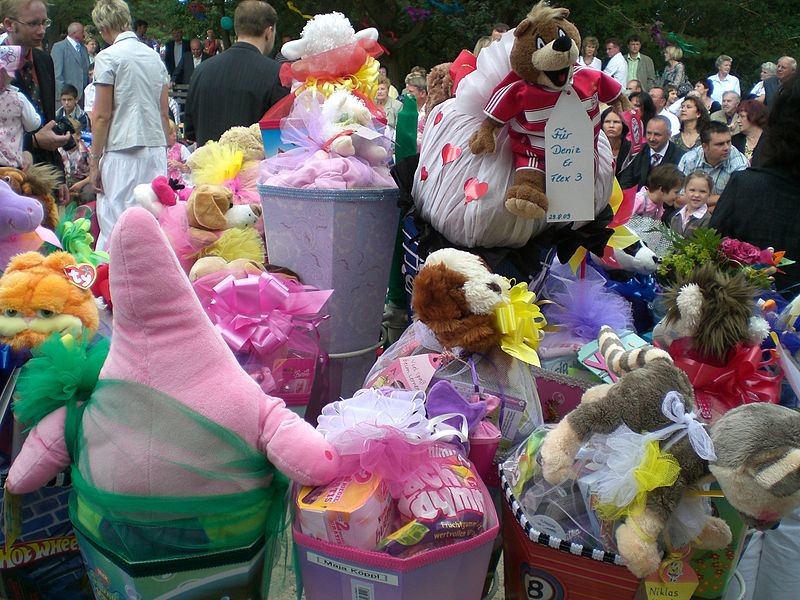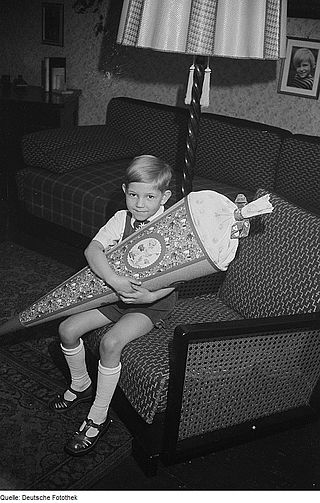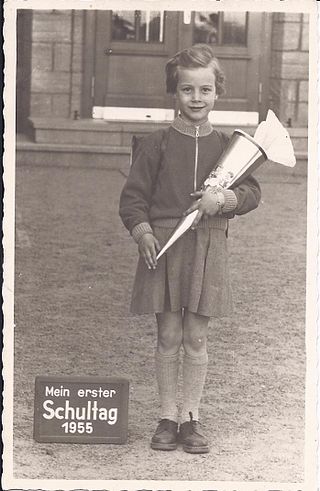Why German Kids Love the First Day of School
They really love learning! JK, it’s candy.

Photo: Wikimedia Commons user Alter Fritz
In the United States, the first day of school is not a single occasion so much as a confounding, staggered trickle of days whose timing is dependent on individual school districts’ seemingly nonsensical schedules. The result is a steady onslaught of backpacked-and-grimacing kid shots on my Facebook feed from mid-July to damn near October. And while this hallowed moment, whenever the hell it might occur, is essentially a national day of jubilation for destroyed parents everywhere, for American kids it means the advent of nine months of standardized test prep and clique-formation. So we can forgive them for being less than thrilled.
Meanwhile, in Germany, the kids can’t wait for the first day of school. They dream of the first day of school. They long for it! Is this simply because the German love of order and rule-following begins at birth, and life outside of formal schooling simply contains insufficient yelling for the Teutonic soul? Probably, but also, on the first day of the first grade (or the erste Klasse, “first class,” pronounced AIR-stuh KLOSS-uh), kiddies in the Federal Republic happen to get a metric fuck-ton of candy.
Specifically, each German first-grader gets a special first-day-of-school present called a Schultüte (SHOOL-tuuut-uh), or “school cone,” a contraption that is often almost as big as the kid carrying it, and stuffed to the gills with Haribo products, check-ruled notebooks and the cutest damn pens you’ve ever seen. The kids tolerate the school supplies, but they live for the candy.

Little Karl-Heinz or whatever in 1950, whose parents really kinda went overboard with the whole postwar “economic miracle” thing. Public domain.
Literally Schultüte means “school bag,” because the cone is hollow and carries things, and anything that is hollow and carries things IS A BAG, and if a German is inaccurate in their language the punishment is seven years of bad sex. (Actually, that’s the punishment for drinking an alcoholic beverage without first toasting and looking deeply into the eyes of everyone you’re with, but hey.)

In 1955, the Schultüte doubled as a weapon, presumably against Communists. Public domain.
The piling on of sweets and other small goodies dates back to the beginning of the 19th Century, when the children of the upper classes celebrated the singular privilege of formal education by getting showered in goodies their plebeian counterparts couldn’t afford. Suck it, Arbeiterklasse, I’m jacked up on Schokobonbons AND I can read!
Eventually, with the advent of universal compulsory public schooling in the Weimar Republic, the Schultüte gained wider popularity, first in large cities, and then finally to its current state of ubiquity in Germany, Austria, and the German-speaking areas of Switzerland.
The bag o’crap was meant to ease jitters related to Einschulung (AYN-shool-ung), which, of course, is a single word the Germans have for the act of going to school for the first time ever, with all of the anxiety and excitement that brings. (Part of the Schultüte lore was to tell kids that at every teacher’s house a “school cone tree” grew, and only when the cones were fully grown and ready to be picked was a child ready to begin their studies.)
And so to this day, parents and grandparents seek to versüßen (fair-ZOOS-un) this transition, which means “to sweeten,” but literally means “to cover in candy.” Hey, that’s how I’ve dealt with my fears for about 35 years, and it works great.
Of course, all good things eventually get ruined, and in recent years the Schultüte has slouched in the direction of the American Easter basket, its contents—once content to remain a humble packet of Haribo colas and a few awesome pencils—metamorphosing into monstrous versions of their former selves: full-sized toys; clothes; even video games. I’m sure some Arschloch somewhere has put an Apple Watch in. Luckily, however, Germany is not the United States, and gleeful conspicuous consumption is considered gauche. (Enter this somber article in Die Welt, about how “sociologists warn of the Schultüte as status symbol.”)
Over here, all we Americans can do is watch helplessly as once-modest holidays turn into Second Christmas (and First Christmas is bad enough); Germans get sternly-worded articles telling them exactly what constitutes the appropriate Inhalt (INN-holt), or contents, of a Schultüte. (To be fair, all German articles are sternly-worded.)
Luckily for American parents who cannot fathom another goddamned Thing they might have to worry about and spend money on, the Schultüte has remained a stubbornly deutsch tradition and isn’t likely to make major inroads over here—with the exception, of course, of German expats and insufferable Teutonophiles like dieses ich hier (points two thumbs at self).
Granted, I’m doing it all wrong. My daughter isn’t starting school this year; that blessed July (or whenever) day is still several moons off. But in a week’s time she is embarking on her first day of preschool (what Germans call Kindergarten). She’s a sensitive soul who tolerates a scant few non-mother humanoids in her prolonged presence, and the transition is going to be pretty brutal for all of us. As such, I’ve been diving head-first into IKEA cinnamon rolls and way more than my “fair share” of the bakery samples at my neighborhood AmazonWholeFoods Avocado and Oligopoly Center™—and so it’s only fair I also sugarcoat, as it were, my kid’s trauma.
Since a proper Schultüte is about six inches taller than my offspring is, I’ve opted to create a miniature version out of shit we have lying around our house. In my household we routinely go to sleep knowing full well there is a near-sentient pile of parmesan cheese on the kitchen floor (because we’ve kept all the lights in the house off since 7 pm in a desperate effort to get our kid on something resembling a young human sleep schedule), so ours is not a household where one partakes in special shopping trips so that an adult can craft.

The LaCroix is there for scale, and also to drown my sorrows. Photo: dieses ich hier.
So what my kid gets is a busted-looking cone of leftover IKEA Hannukah wrapping paper held together with packing tape, in which I’ve stuffed half a kilogram of “Rainbow Beans” (what she calls Jelly Bellys, and my house’s general currency), one those godforsaken Mystery Toys small people are obsessed with, and, the piece de resistance, the sad little #MAGA version of a Kinder Surprise Egg, which (since Americans ruin everything) is not an egg at all so much as two sad, separate half-eggs, with the shitty little toy in one sealed compartment and a dollop of liquified Kinder-chocolate gloop in the other. (Kinder chocolate is “healthy” because it contains less cocoa and more milk than adult chocolate. Clearly.) Real Kinder eggs are, of course, contraband in the United States, because a kid could potentially choke on the toy on his way to buy a gun.
At any rate, my daughter is set to learn at least one important lesson on her first day of school, thanks to German children everywhere: There’s nothing as important as a good education. Just kidding, all that matters is candy.
